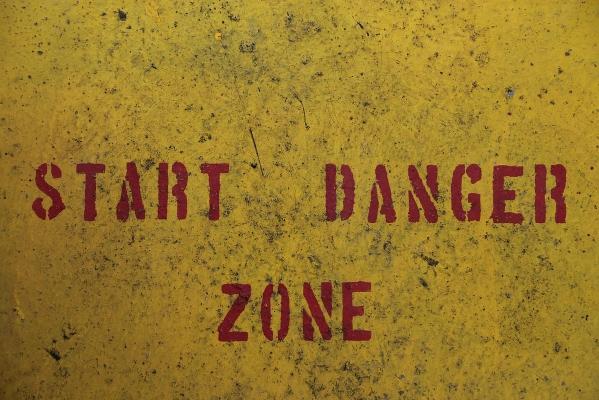MANAGING THE CONFLICT DANGER ZONE
Even couples who enjoy a healthy and satisfying relationship can often find themselves in conflict. If that conflict escalates, it sometimes can become harmful to each person and the relationship. It can enter the conflict danger zone.
Avoiding the Danger Zone

Many times, we can avoid entering the danger zone if we will manage our stressand anxiety. Unfortunately, our stressors often lead us into those situations in which we are arguing but don’t even know what we are arguing about! That is usually a sign of stress on both of your parts. Here are some ideas to help you to manage yourself and your stress and anxiety more effectively in communication:
- Change your pace. Sometimes the best thing to do to lower your stress level before getting upset is slow down. Wait and pause to consider what you will say in response to your partner. Then, pause again to consider what your partner says to you. Be careful to hold this slower pace, and don’t allow anger to speed up the pace.
- Change your breathing. Slow not only your speaking and responding but also your breathing. For example, breathe in, hold it for a moment, and slowly blow it out. A good rule of thumb is to make the exhale twice as long as the inhale. Example: Inhale for four counts and exhale for eight counts. This will have a significant physiological calming effect and help you stay in your “thinking brain.”
- Allow your partner to match your pace. Don’t be impatient if your partner slows down their reactions as well. They may be taking their cues from you! While they are thinking or responding slowly, calm yourself through your breathing and listening objectively to them.
- Ground yourself. Sit if you can and plant your feet firmly on the floor. Tell yourself, “I’m okay. I can handle this.”
- Assess your situation. Look around the room. See that you are not in any physical danger. Then, calm yourself using the classic anxiety reduction technique: Try to find five blue things in the room, then five red things, then five green things, etc.
Identifying the Danger Zone
If self-management of your stress and anxiety isn’t effective in the situation and the conflict between you and your partner escalates, you are entering the danger zone. How do you know if you are in an emotional danger zone? Use the questions below to help you assess your emotional and relational state:
- Are you failing to hear and process what your partner is saying?
- Are you unable to “listen to learn” so that you can understand their viewpoint and feelings?
- Are either or both of you name-calling and using verbal put-downs?
- Are either or both of you invading personal space and yelling?
- Are either or both of you throwing items?
- Are either or both of you touching the other in non-loving and unwelcome ways?
Answering “yes” to one or more of these questions indicates that you are in a danger zone. This is when you and your partner both need a change of environment. Let them know that you need a break and value them and your relationship too much to continue until things are calmer. You can go into separate rooms or outside in different areas until you no longer feel flooded by negative emotions.
Defusing the Conflict Danger Zone
- Once you are in a different place, practice deep breathing as discussed above. Repeat as many times as you need.
- Use positive affirmations. Then, remind yourself of the truths about yourself. These are positive affirmations such as, “I am loved, I am brave, I am supported, I am strong, I am worthy, I am capable,” etc.
- Hug yourself. Wrap your arms around yourself with the right arm underneath and breathe deeply three times. Then do the same with the left arm underneath.
- Listen to soothing music. Calming music helps to relax you from an overloaded nervous system. Slower beats are better because they help your heart rate return t normal.
- Take a walk. Observe your surroundings and take it all in without judgment or criticism. Be aware of architecture, plants, trees, bird sounds, etc.
- Engage in your favorite self-care activity. It could be exercise, a warm shower or bath, stretching for relaxation, guided meditation, or aroma therapy.
Now that you’re feeling calmer and not flooded by your emotions, you are ready to re-engage more deeply with your partner.
- Remember that you want a deep, loving connection with this person. They are giving you their perspective and expressing their feelings. It’s not about who’s right and who’s wrong. It is about perspective. You do not have to agree with them, but come with an open attitude and be ready to listen, hear and validate them.
- Become genuinely interested in their perspective. When you are listening, for five minutes, ask only questions to clarify what you are hearing. Make sure they are sincere questions and not loaded ones like, “How could you possibly think that?” A better question would be, “How did you come to that conclusion?” You may feel your anger dissipating when you begin to see things from their perspective.
- Let your partner know how you are feeling. Tell your partner what you feel about the issue – why it is difficult for you, why it’s important to you, and how you would feel if it was resolved. Avoid making “you” statements. Allow them to ask questions, and don’t get defensive.
- Tell your partner something you admire or appreciate about them. At any point in the conversation, this can turn it toward the positive and helpful. For example, “Thank you for sharing your perspective and your feelings. I feel much closer to you now, “or “I admire your tenacity, and it makes me feel proud that you are not a quitter!” Be sure to let them know how it made/makes you feel. Feeling words are so important!
- Be aware of your reactions and responses. Ask yourself questions such as: Why did this bother me so much? What does my response say about me? What can I learn from this that will be helpful in the future?
With awareness and the desire to grow closer through conflict rather than further apart, you and your partner can learn to manage yourselves and the Conflict Danger Zone.
If you can’t seem to get out of the Conflict Danger Zone, we can help. It’s what we do!

